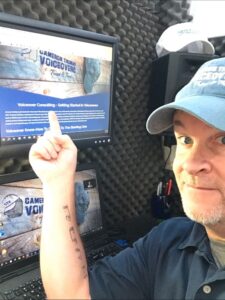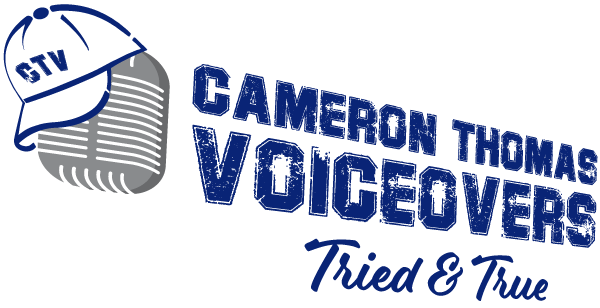Voiceover Consulting - Getting Started In Voiceovers
Are you looking to get started in voiceovers? Wondering how to record your voice, make demos, and create a VO business? Curious about how to find voice work? After 15 years of being a professional voiceover guy, many folks ask me questions about the industry. Yes, it often starts as people saying you have a good voice. But there is MUCH more to it than “just reading into a microphone”. There is practicing, coaching and training, setting up recording gear and a studio or recording space, making demos, finding voice work, creating a business with invoices, websites, and marketing…TONS of marketing. Before jumping headfirst into extensive coaching programs and expensive gear, let’s get you oriented with a voiceover consulting session to help get you started on your voiceover journey!
Voiceover Know-How To Get You To The Starting Line
I was in the same boat years ago. After a decade in the Air Force, I started working as a radio meteorologist, and then as a radio ski reporter for Snocountry (more about me here). Both of these jobs introduced me to the broadcasting world and I learned how to record and produce radio forecasts and reports. One of my broadcast friends mentioned voiceover work. And then it began.
It took me many weeks and months of research before a transition to doing voice work from home. After a while, I eventually landed jobs for many recognizable brands, such as AAA, Nationwide, Nikon, and McDonald’s. But I made some rookie mistakes – some of which likely cost me work. There are many opportunities to start a VO career if you take the right steps. My consultations will help you make sense of everything and to help steer you in the right direction in the VO industry.
Consulting Topics:
- Research
- Finding helpful, reputable resources
- Industry standards & best practices
- Voice Training & Coaching
- Finding reputable coaches
- What is training/coaching like?
- Voiceover Demos
- What are they?
- Finding reputable demo producers
- How are they recorded/produced?
- Studio/Gear/Tech
- What microphone to use
- Setting up a basic recording studio
- How to record and audition
- VO Rates
- Setting your own rates
- Getting Voice Over Work
- Where to find jobs
- What is the project process like
- And Any Other Topics You’d Like To Discuss
Click the Paypal button to BUY A SESSION and then SCHEDULE A CONSULT through the button below for a 1 hour session.
Testimonials
“Thank you for taking the time to advise me on VO marketing, as well as some of the nuances of the “conversational” reads that can be tricky! You have a wealth of information to share, as well as a humble heart to selflessly share your knowledge and encourage others. I would recommend anyone to talk with you, whether they’re just getting started in VO or for those who need a few new marketing tips and technique tools under their belts.“
“Super professional. A wellspring of knowledge and a great person to talk with.“
Topics To Consider
Do Your VO Research First
Before the first step, do your research. I never did a voiceover consulting session or coaching right away. Just about everything I learned initially about VO was from online forums so this is a great place to start. You’ll find that the voiceover community is very supportive. Here is a real good one – http://vo-bb.com/phpBB2/ You can also join various online VO groups on Facebook and other social media sites. You will find a LOT of info on these forums and sites, so dig through all the threads and soak it all up. It will take some time.
Voice Training & Coaching
The #1 area to start a voice-over career is finding a voiceover coach. This is absolutely key. While I am happy to offer guidance on beginning steps, I am not a voice or acting coach. My voiceover consulting sessions are to help you find a good starting point with reputable resources before you dive into anything. You need someone to evaluate your skills and to help you find your voice. What type of work are you more suited for (ie, commercials, audiobooks, character work, video games, or corporate narration)? Coaching takes time and commitment so be prepared to invest. Even experienced VOs use coaches on a regular basis and it’s common practice – even recommended – to have more than one coach.
There are many coaches out there but I can help direct you to very reputable ones. If you’re looking for a hands-on, in-studio learning experience in the New Hampshire area, a voiceover friend of mine hosts a class that can help. But for online coaching/training, there are many individual coaches but there are also online training programs that provide voice coaching/training as well as demo production.
Many voiceover talents come from acting/drama backgrounds so they have those acting chops that translate well to the microphone. Local schools/community colleges or theaters (improv) are great opportunities to develop those skills as well.
Working with a coach will prepare you for the next step – your demo.
Voiceover Demos
A demo is a sample of what you can do. This is your “business card” or “headshot” to potential clients. It is the MOST critical aspect to connect you with voiceover work. Agents won’t even consider you without one. Demos should be done for each specific genre of work. So you may likely need several to highlight your talent in those areas. Here is a site with some demo examples at Demos That Rock. A professionally produced demo is not cheap! Unless you work as a sound engineer or producer, do NOT self-produce your demo! I tried it myself early on and it most likely cost me work.
aspect to connect you with voiceover work. Agents won’t even consider you without one. Demos should be done for each specific genre of work. So you may likely need several to highlight your talent in those areas. Here is a site with some demo examples at Demos That Rock. A professionally produced demo is not cheap! Unless you work as a sound engineer or producer, do NOT self-produce your demo! I tried it myself early on and it most likely cost me work.
Working with someone locally would be best for in-person coaching and recording in a professional studio; however, it can be done remotely. I worked with a coach and studio in the Boston area but it tooks weeks of coaching, practice before getting into the studio to record my demo. You may even work with other voiceovers for dialogue portions of your demo.
VO Studio, Gear, and Tech
To get started in voiceovers, you’ll need to record from a home studio. Among the previous “getting started” sites above, there are numerous other studio/gear resources. The Voiceover Bodyshop guys (Dan Leonard and George Whitam) have a  great podcast series, “Tech Talk”, and other topics. Here are their Youtube and Facebook pages to browse through previous episodes.
great podcast series, “Tech Talk”, and other topics. Here are their Youtube and Facebook pages to browse through previous episodes.
If you like videos, the Booth Junkie (Mike Delgaudio) has been making VERY informative videos on studio gear for a long time – he does a great job talking about the basics and goes out of his way on actual demonstrations. Here’s one about setting up a studio. He does a lot of other studio/gear tutorials, microphone comparisons, and all sorts of other very helpful industry topics.
To showcase your demos, you absolutely need a professional website to where you can direct clients. Voice Actor Websites and VoiceActor.com have great website options tailored specifically for voice actors. Check out these interviews with their team here and here. They helped me build my site and for a reasonable cost. In fact, I enjoyed the experience so much, that now I am working for them helping other voice talent build their sites!
Voice Over Rates For Projects
When you’re ready or work, what are you going to charge? Each VO has their own rates based on many individual factors such as markets, platforms, and time usage. Everyone’s circumstances are different so rates may vary widely, but please understand how offering rates well below industry (non-union) standards can impact the industry as a whole. There has been much debate about it over the years so this is a very important topic for you to understand.
Getting Voice Work
After a LOT of homework, preparation, and a demo, you can then start marketing your voice. However, that topic is way more involved for this page, so I am only going to touch on it briefly here. Some say the business of voiceover is 80-90% marketing and the rest is actual recording so this will be the bulk of your work going forward. You could test the waters with “pay-to-play” casting sites such as Voice 123 and Boldago. These are subscription sites where you pay an annual fee, and get access to auditions for various jobs, or “leads.” While you can find decent work here, they are highly competitive and effective under certain circumstances. Casting sites are only PART of your overall marketing strategy.
Most likely you will need to go directly to the source – talent agencies, video production companies, ad agencies, and marketing companies. This means emails, calls, social media, and networking in various ways to get your voice noticed. There are many online podcasts and coaching around various marketing strategies. Once you have a demo(s), one of my good friends, Nikki Lu Lowe, now offers a great coaching course called “The Drive” which covers the business mindset of voiceover and setting yourself up for success. I can provide an even more comprehensive library of reputable coaches, demo producers, and agents.
Ready For A Consultation For Your Voiceover Career?
This is just tip-of-the-iceberg stuff. A voiceover consulting session will cover this in more detail; however, for now, I wanted to mention the more important areas that you need to consider for a voiceover career. I also wanted to share a few resources that you can get a jump on. But it will open up to a much wider universe that you may not have realized. It takes a LOT of time reading and researching – like weeks and months, even years. Absorb as much as possible. It’s an ongoing learning experience, too, so don’t stop after hitting just a few websites. I’m still researching because industries change and evolve. You will eventually hear common themes and ideas about the business that will shape your approach to the world of VO so that you can start defining your path.
That’s where I come in. I am here to help you make sense of it all, provide more context around these topics, and answer all of your questions. After taking this all in, let’s set up your consultation – please email me or send me a note through the Contact form for scheduling and rates.
